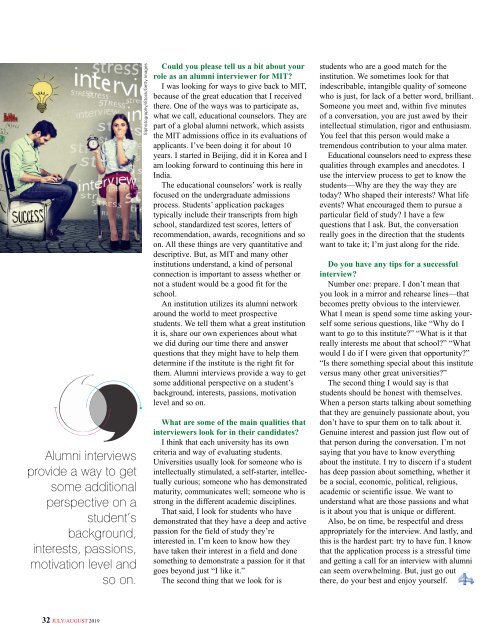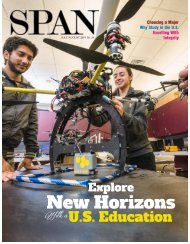July-August 2019
You also want an ePaper? Increase the reach of your titles
YUMPU automatically turns print PDFs into web optimized ePapers that Google loves.
Alumni interviews<br />
provide a way to get<br />
some additional<br />
perspective on a<br />
student’s<br />
background,<br />
interests, passions,<br />
motivation level and<br />
so on.<br />
SIphotography/iStock/Getty Images<br />
Could you please tell us a bit about your<br />
role as an alumni interviewer for MIT?<br />
I was looking for ways to give back to MIT,<br />
because of the great education that I received<br />
there. One of the ways was to participate as,<br />
what we call, educational counselors. They are<br />
part of a global alumni network, which assists<br />
the MIT admissions office in its evaluations of<br />
applicants. I’ve been doing it for about 10<br />
years. I started in Beijing, did it in Korea and I<br />
am looking forward to continuing this here in<br />
India.<br />
The educational counselors’ work is really<br />
focused on the undergraduate admissions<br />
process. Students’ application packages<br />
typically include their transcripts from high<br />
school, standardized test scores, letters of<br />
recommendation, awards, recognitions and so<br />
on. All these things are very quantitative and<br />
descriptive. But, as MIT and many other<br />
institutions understand, a kind of personal<br />
connection is important to assess whether or<br />
not a student would be a good fit for the<br />
school.<br />
An institution utilizes its alumni network<br />
around the world to meet prospective<br />
students. We tell them what a great institution<br />
it is, share our own experiences about what<br />
we did during our time there and answer<br />
questions that they might have to help them<br />
determine if the institute is the right fit for<br />
them. Alumni interviews provide a way to get<br />
some additional perspective on a student’s<br />
background, interests, passions, motivation<br />
level and so on.<br />
What are some of the main qualities that<br />
interviewers look for in their candidates?<br />
I think that each university has its own<br />
criteria and way of evaluating students.<br />
Universities usually look for someone who is<br />
intellectually stimulated, a self-starter, intellectually<br />
curious; someone who has demonstrated<br />
maturity, communicates well; someone who is<br />
strong in the different academic disciplines.<br />
That said, I look for students who have<br />
demonstrated that they have a deep and active<br />
passion for the field of study they’re<br />
interested in. I’m keen to know how they<br />
have taken their interest in a field and done<br />
something to demonstrate a passion for it that<br />
goes beyond just “I like it.”<br />
The second thing that we look for is<br />
students who are a good match for the<br />
institution. We sometimes look for that<br />
indescribable, intangible quality of someone<br />
who is just, for lack of a better word, brilliant.<br />
Someone you meet and, within five minutes<br />
of a conversation, you are just awed by their<br />
intellectual stimulation, rigor and enthusiasm.<br />
You feel that this person would make a<br />
tremendous contribution to your alma mater.<br />
Educational counselors need to express these<br />
qualities through examples and anecdotes. I<br />
use the interview process to get to know the<br />
students—Why are they the way they are<br />
today? Who shaped their interests? What life<br />
events? What encouraged them to pursue a<br />
particular field of study? I have a few<br />
questions that I ask. But, the conversation<br />
really goes in the direction that the students<br />
want to take it; I’m just along for the ride.<br />
Do you have any tips for a successful<br />
interview?<br />
Number one: prepare. I don’t mean that<br />
you look in a mirror and rehearse lines—that<br />
becomes pretty obvious to the interviewer.<br />
What I mean is spend some time asking yourself<br />
some serious questions, like “Why do I<br />
want to go to this institute?” “What is it that<br />
really interests me about that school?” “What<br />
would I do if I were given that opportunity?”<br />
“Is there something special about this institute<br />
versus many other great universities?”<br />
The second thing I would say is that<br />
students should be honest with themselves.<br />
When a person starts talking about something<br />
that they are genuinely passionate about, you<br />
don’t have to spur them on to talk about it.<br />
Genuine interest and passion just flow out of<br />
that person during the conversation. I’m not<br />
saying that you have to know everything<br />
about the institute. I try to discern if a student<br />
has deep passion about something, whether it<br />
be a social, economic, political, religious,<br />
academic or scientific issue. We want to<br />
understand what are those passions and what<br />
is it about you that is unique or different.<br />
Also, be on time, be respectful and dress<br />
appropriately for the interview. And lastly, and<br />
this is the hardest part: try to have fun. I know<br />
that the application process is a stressful time<br />
and getting a call for an interview with alumni<br />
can seem overwhelming. But, just go out<br />
there, do your best and enjoy yourself.<br />
32 JULY/AUGUST <strong>2019</strong>



